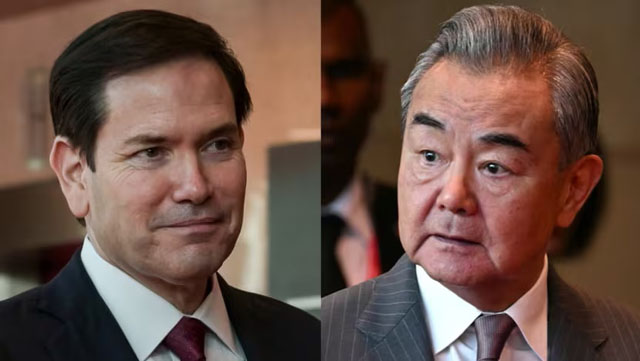News Flash
News Flash

KUALA LUMPUR, July 11, 2025 (BSS/AFP) - US Secretary of State Marco Rubio
and Chinese top diplomat Wang Yi had a "positive" meeting in Malaysia on
Friday, both sides said, in an apparent bid to ease tensions between the
rival powers.
Rubio and Wang's first face-to-face meeting since US President Donald Trump
returned to office came as Washington and Beijing are locked in disputes
ranging from trade to Taiwan -- and both countries vie for greater influence
in the region.
"I thought it was a very constructive and positive meeting," Rubio told
reporters after the hour-long talks in capital Kuala Lumpur, but he stressed:
"It was not a negotiation."
"I think we left it feeling as there's some areas we're gonna be able to work
together on."
Rubio was also optimistic that a meeting between US President Donald Trump
and Chinese leader Xi Jinping would happen.
"There's a strong desire on both sides to do it," Rubio said, adding no date
was set.
Beijing said in a statement "both sides agreed that the meeting was positive,
pragmatic and constructive".
Both countries agreed to "enhance communication and dialogue through
diplomatic channels... and explore expanding cooperation areas while managing
differences," China's foreign ministry said.
The sit-down between Wang and Rubio, a longtime China hawk, came as Asian
foreign ministers wrapped up three days of talks at an Association of
Southeast Asian Nations gathering in Kuala Lumpur.
Top diplomats from Russia, the European Union, Australia, Britain and Canada
also attended.
- 'Not sustainable ' -
US officials said ahead of Rubio's first trip to the region as secretary of
state that Washington was "prioritising" its commitment to East and Southeast
Asia.
While US tariffs overshadowed the gathering, Rubio said he was "warmly
received" by Asian partners as he sought to placate concerns over the duties.
"If you look at some of these trade deficits, they're massive. That has to be
addressed," Rubio said at the end of his whirlwind trip.
"Everybody here is a mature leader who understands that that's not
sustainable."
Trump has threatened punitive tariffs ranging from 20 to 50 percent against
more than 20 countries, many in Asia, if they do not strike deals with
Washington by August 1.
ASEAN described the tariffs as "counterproductive" and a threat to regional
growth, according to a joint statement released Friday.
Long-time US ally Japan faces a 25 percent across-the-board levy, separate
from similar charges already imposed on cars, steel and aluminium. South
Korea faces a similar tariff.
Rubio met his Japanese and South Korean counterparts on Friday, with his
spokeswoman Tammy Bruce calling it an "indispensable relationship".
Wang told Malaysian Prime Minister Anwar Ibrahim earlier Friday that
Washington's "unilateral imposition of high tariffs is irresponsible and
unpopular," according to a foreign ministry statement.
Malaysia's Foreign Minister Mohamad Hasan told a closing news conference the
ASEAN meeting mentioned "each country's concerns respectively" regarding
tariffs.
Tensions between the United States and China have ratcheted up since Trump
took office in January, with both countries engaging in a tariff war that
briefly sent duties on each other's exports sky-high.
- Deep mistrust -
Washington hit China with additional levies of 145 percent on its goods as
both sides engaged in tit-for-tat escalation, while China's countermeasures
on US goods reached 125 percent.
Beijing and Washington agreed in May to temporarily slash the staggering
tariffs -- an outcome Trump dubbed a "total reset".
However, deep mistrust remains between the two countries, with each
suspecting the other of trying to weaken its influence.
US Defense Secretary Pete Hegseth accused China in late May of "credibly
preparing to potentially use military force to alter the balance of power" in
the Asia-Pacific region.
He also claimed that Beijing "trains every day" to invade self-ruled Taiwan,
which China claims as part of its territory.
In response, Chinese diplomats accused the United States of using the Taiwan
issue to "contain China" and called on Washington to stop "playing with
fire".